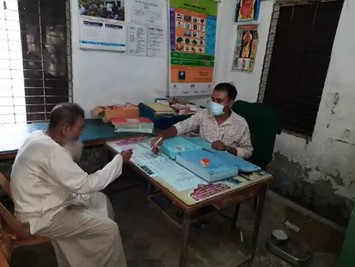
“A turning point”: how ORS, zinc, and WASH transformed a Bangladesh village

Note from DefeatDD: This blog originally appeared on the Nutrition International website.
Zinc and oral rehydration solution (ORS) are the World Health Organization’s recommended first-line treatment for diarrhea, and Nutrition International’s Zinc Alilance for Child Health (ZACH) project provides financial and technical support to scale up treatment with zinc and ORS in countries with a high burden of childhood diarrhea. Together with preventive measures including vaccines, breastfeeding, nutrition, and improved water, sanitation, and hygiene, timely treatment for diarrhea saves lives.
Bil Dumuria is a village in Pirojpur, Bangladesh surrounded by lakes and streams. But instead of bringing promise, the water was sprouting problems. The village was plagued with waterborne diseases. Heavy rainfalls during monsoon season caused floods. Cases of diarrhoea and dysentery were prominent in the region. Sanitation and good hygiene practices — like the use of latrines and handwashing — were not common and access to clean drinking water was limited.
Anwar Kabir is a health assistant who has been working in the region since 2014. “A decade ago, the water, sanitation and hygiene conditions of Bil Dumuria were very poor,” he said. “As a result, the number of waterborne diseases were very high which claimed many lives in the village.”
In 2019 Nutrition International organized a training on diarrhoea through the Zinc Alliance for Child Health (ZACH). Kabir, and other health workers, were educated on the use of zinc and low-osmolarity rehydration salts (LO-ORS) to treat diarrhoea cases promptly and the role of proper hygiene practices to prevent diarrhoea in the first place. The training was the first time many health workers discovered the link between zinc’s role in boosting immunity and helping to prevent diarrhoeal episodes.
Empowered with knowledge from the training, Kabir began educating the community about the combined power of zinc and LO-ORS to treat severe cases of diarrhoea. Childhood diarrhoea is a leading cause of death for children under five years old, claiming more than half a million lives annually across the globe. It’s also the leading cause of malnutrition in children under five. Kabir equipped the community with the knowledge to access zinc and LO-ORS to save lives. While recommending treatment, Kabir would also encourage families to adopt healthy hygiene practices as important preventative measures.
The local government departments supported his efforts. As the community came to understand the role hygiene played to prevent diarrhoea and generally improve quality of life, residents started demanding actions to improve the living conditions in the village. The local government departments responded by building latrines in homes of families in need and installing tube wells to provide access to safe and clean drinking water. The health department engaged with community groups to sensitize people about sanitation and hygiene promotion.
All this has been possible due to the hard work of dedicated health workers and community activists like Kabir who are motivated to improve the living conditions of their village.
Kabir cites the training as a turning point for the village. Latrines have been installed in all homes. Handwashing with soap has become a common habit. With improved hygiene, cases of childhood diarrhoea are on a downward trend. Nowadays, Kabir sees only five cases of diarrhoea in a month, a stark reduction from around 50 cases daily five years ago. For the cases he does see, he recommends the zinc and LO-ORS regime he learned about at the training.
“The improvement in the hygiene practices in our village has started paying off,” Kabir shared. He credits zinc as a game-changer in reducing severe cases of diarrhoea. “This information needs to be regularly provided. I conduct counselling sessions to educate people about the use of zinc along with oral rehydration salts for diarrhoea management.”
The COVID-19 pandemic has not deterred Kabir. Wearing a facemask, carrying a bottle of sanitizer in his pocket and taking all precautions, he continues his regular visits in the community and remains a steady presence promoting good hygiene.


